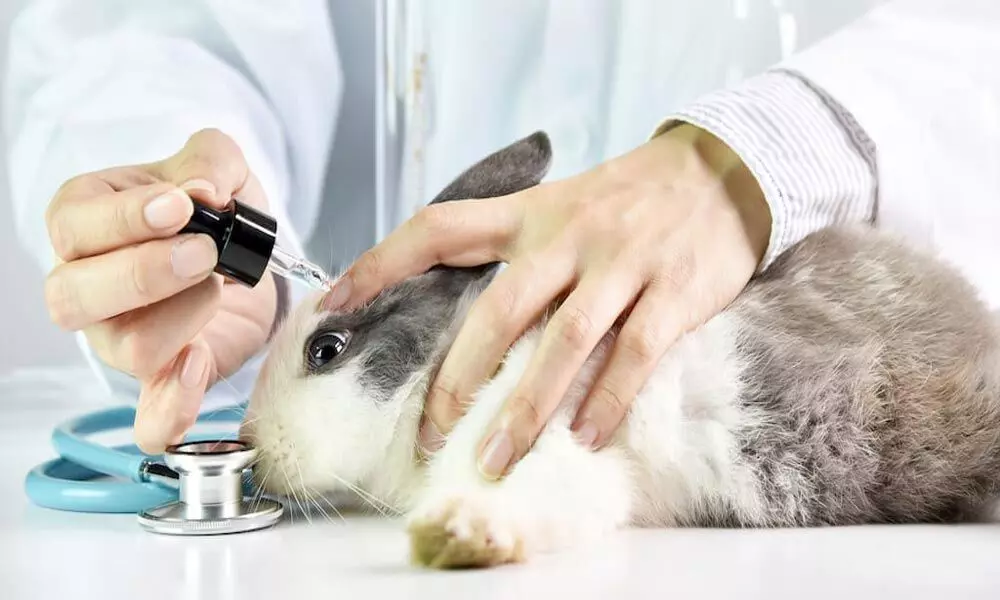Will pharma industry bite the bullet?
As experts and researchers are divided on the issue, this billion dollar question has been evading a clear-cut answer for quite some time
image for illustrative purpose

A section of the scientists argues that advances in the management of these diseases through the development of diagnostics, prophylactics and therapeutics can come about only through the continued use of animal models in medical research
Will the pharmaceutical industry and the biomedical researchers in the country agree to curb animal testing in pharmaceutical research as is being demanded by the People for the Ethical Treatment of Animals (PETA)? As experts and researchers are divided on the issue, this billion dollar question has been evading a clear-cut answer for quite some time.
PETA, an American animal rights organization, has been knocking at the doors of the Indian Prime Minister's Office (PMO) seeking the PMO's intervention to phase out animal experiments in pharmaceutical research to end cruelty against animals. Supporters of animal welfare are of the view that most of the drug discoveries are possible without experimentations in animals and inflicting cruelty on them. It is true that millions of monkeys, dogs, rats, and other animals are mutilated, burnt, blinded, cut open, poisoned, and drugged in laboratories every year. The animal activists argue that not only are these tests cruel, the results are also inapplicable to humans because of the vast physiological differences among species.
To buttress its point, PETA has claimed that the failure rate of new drugs developed using animals in specific research areas exceeds 95 per cent. It is 100 per cent in HIV/AIDS vaccine research followed by 99.6 percent in Alzheimer's disease research, and 96.6 per cent in cancer research. Besides this, failure rate of new drugs developed using animals in Strokes is 100 per cent. Although more than 1,000 experimental treatments aimed at protecting brain cells during acute strokes have been developed using rodents, none of them have been effective in humans, it further claimed.
To further support its view on the issue, PETA India conducted biomedical research without animals, and the research by scientists with PETA India and its affiliates has revealed the utter failure of the animal experimentation paradigm to help humans suffering from diseases. As an alternative to the pharmaceutical research involving animals, PETA India has now come out with a plan christened as 'Research Modernization Deal' and called on the Indian government to embrace this new plan. The new Deal outlined a roadmap for replacing the use of animals in experiments with human-relevant methods. It also outlined steps to eliminate the use of animals immediately in areas in which they have already been shown to be poor surrogates for humans and critically review additional areas of research to determine where animal use can be ended. The Deal emphasized the need for implementing a robust ethical evaluation system as part of policies governing the use of animals, thereby increasing the transparency, accountability, and effectiveness of the regulatory process.
It is true that an opinion is gradually emerging in the developed nations in favour of doing pharmaceutical research sans animals. In early last year, the European Parliament had passed a resolution that has committed to phase out animal experiments in pharmaceutical research. In October last year, the European Parliament voted in favour of framing an action plan to curb animal testing in pharmaceutical research. Members of European Parliament (MEPs) supported a motion for a resolution to speed up the transition to innovation without using animals in research, regulatory testing, and education. Besides European Parliament, a handful of US lawmakers have recently introduced two Bills aimed at ending mandatory animal testing of new pharmaceuticals destined for human trials.
All said and done, the fact remains that virtually all major medical advances for both humans and animals have been achieved through bio-medical research by using animal models. So much so that over 50 Nobel Prize winning researchers of the last Century in Medicine and Physiology utilised animals. The heart-lung machine, an important component of open heart surgery, was developed in dogs and pigs, and cardiac pace-makers were developed and tested in dogs. Same is the case with common sutures, clips, staples and grafts which are essential components of surgical interventions. Several life-threatening terminal conditions, such as renal failures, strokes, cardiac infarcts, degenerative musculo-skeletal diseases etc., are being treated through transplants, angioplasty, bypass surgery, orthopaedic implants, insulin pumps and a whole range of transplantable and disposable devices were developed in the first place in animals. Morbidity and mortality from TB, polio, diphtheria, several bacterial and fungal infections, diabetes, several diseases of the Central Nervous System, such as depression, schizophrenia, anxiety, Parkinson's disease, Alzheimer's and epilepsy; stroke and other cardiovascular diseases, have all come down dramatically due to availability of new drugs.
But unfortunately, in spite of all these advances that medical science has made over the years, a large number of intractable diseases still remain incurable. Cancer, several viral diseases, immunodeficiency disorders including HIV/AIDS, degenerative diseases due to increasing number of ageing populations and many life-style-induced diseases fall under this category. A section of the scientists argues that advances in the management of these diseases through the development of diagnostics, prophylactics and therapeutics can come about only through the continued use of animal models in medical research.
Now the issue is pending with the PMO for a final call. Whatever be the final decision of the Central government, developing new drugs for the next generation should be the priority.
(The author is freelance journalist with varied experience in different fields)

